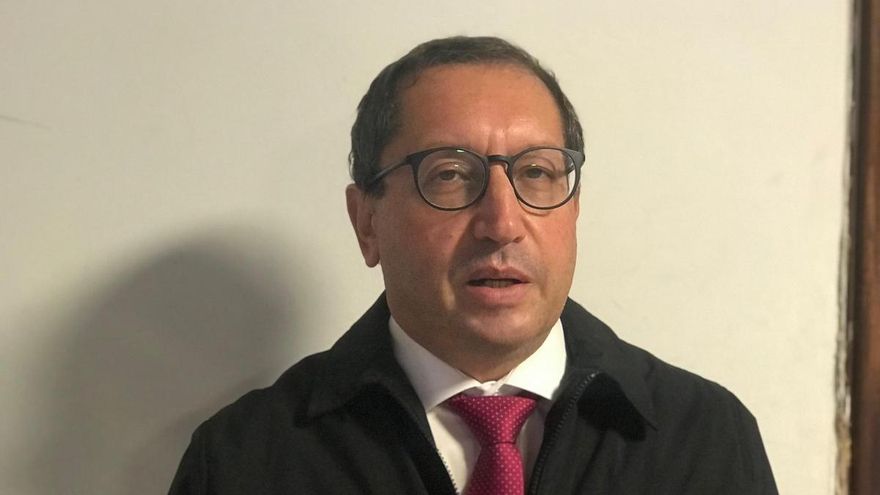
Jose Fernando Diaz Medina, born in Icod de los Vinos In 1963, he is a writer, economist, teacher, journalist and researcher. Author of 21 books and numerous articles, he was appointed official chronicler of the City of Drago in 2009 and, for six months, he has also held the position of president of the Board of Official Chroniclers of the Canary Islands, from where it works to ensure that all the municipalities of the islands appoint their official chronicler or chroniclers; that their work on the history and intrahistory of the peoples be disseminated, and that public commitment to the defense and maintenance of historical archives increase.
How did you get to become the president of the Board of Official Chroniclers of the Canary Islands?
In 2009, endorsed by the signatures of numerous residents of Icod de los Vinos, I was appointed official chronicler of my native municipality. I had the endorsement of people like Andrés Sánchez Robayna, professor of Philology at the University of La Laguna (ULL); José Velázquez, chronicler of the Villa and Puerto de Garachico, or Manuel Hernández, professor and historian at the University of La Laguna. A few years earlier, in 1995, the Gran Canaria Chroniclers Board had been created to strengthen and generate more activities. In 2005 this board was created for the entire Canary Islands. On June 4 of this year, in Gáldar, I had the honor of being elected president of the Board of Official Cronistas de Canarias. By rotation, for the period 2021-2024 a chronicler from Tenerife was playing, after the end of the La Palma period.
Does Gran Canaria have more tradition of official chroniclers than Tenerife?
Yes, they have a certain advantage over us and that encourages us to work so that new official chroniclers continue to be appointed in Tenerife in the municipalities where this figure is not recognized. We know that in municipalities such as Los Realejos, La Orotava, Los Silos, Santiago del Teide, Arona or Guía de Isora there is an intention to appoint chroniclers. And we hope that it can be finalized soon. There is also the possibility that the councils appoint a chronicler or a team of official chroniclers, and in this line we want to advance with councils such as those of Tenerife and La Gomera.
Which municipalities in Tenerife currently have official chroniclers?
We have Eliseo Izquierdo, in La Laguna; José Velázquez Méndez, in Garachico; José Manuel Ledesma, in Santa Cruz de Tenerife; Febe Fariña Pestano, in Arafo; Emiliano Guillén Rodríguez, in Arico and Granadilla de Abona; Octavio Rodríguez Delgado, in Güímar and Candelaria; Pedro Ángel Gómez Barreto, in San Juan de la Rambla; Salvador Pérez, in La Guancha; Nelson Díaz Frías, in Vilaflor, and José Fernando Díaz Medina, in Icod de los Vinos. And there are still quite a few municipalities to join. Lately there is more interest and, for example, this year chroniclers have been appointed in Agüimes, Arucas and in La Frontera, on the island of El Hierro. In this, the biggest problem we have are the rules and regulations in force in each municipality, because they are very different and sometimes they do not even have it contemplated.
What are your main goals?
We work to ensure that all the municipalities of the islands appoint their official chronicler or chroniclers, because depending on the size they can be more than one person; so that the work we carry out on the history and intrahistory of the peoples, which otherwise runs the risk of being lost, is disseminated, and also so that public commitment to the defense and maintenance of local historical archives increases. Apart from the regional board, on each island there is a working commission. So, in short, we want to ensure that all municipalities appoint an official chronicler and also that this figure is better known, because there are many people who do not know what we are for.
What functions does an official chronicler have?
The official chroniclers are honorary positions that name the municipalities among those people who stand out in the study and dissemination of the history and customs and traditions of their peoples. Among the functions that they perform altruistically, those of advising their town councils on historical and cultural matters; the collaboration with the municipal and parish archives, as well as its participation in conferences, proclamations and publications. Our peculiarity is that many times we look at the disclosure of the history of people who usually do not appear in books. Through the regional board we have also published 16 issues of Crónicas de Canarias, a magazine in book format that disseminates our research.
Do you think your work is little known?
Generally speaking, yes. There are municipalities and media that are more involved in the dissemination of the work of the chroniclers, but it would be desirable that they at least have a reserved space on the municipalities’ web pages.
President of the Canarian chroniclers
The official chronicler of Icod de los Vinos, José Fernando Díaz Medina, was appointed on June 4 in Gáldar, in Gran Canaria, as the new president of the Board of Official Chroniclers of the Canary Islands, a position he will hold until 2024. He is accompanied by the board of directors as secretary José Antonio Luján, official chronicler of Artenara, and as treasurer, María Teresa Cabrera, official chronicler of Valsequillo, also on the island of Gran Canaria. Díaz Medina is also part of the Royal Spanish Association of Official Chroniclers, who present themselves as “the heirs of those who, over the centuries, left evidence with their writings and investigations of history, under the protection of qualities such as objectivity and impartiality »















